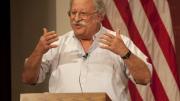current unrest in Syria has derailed a project there in which Marshall Ganz, a lecturer on public policy at the Harvard Kennedy School and a lecturer on social studies at the College, had begun training Syrian youth in community organizing. Ganz visited Syria, once in 2009 and again in 2010, under the auspices of the Monitor Group to explore the feasibility of launching a leadership development project for young people. "The premise we were working from is that young people are the future of that nation, and unless they had ownership of that future, they weren't going to help shape it," Ganz said in an interview with Harvard Magazine this week. "With a regime like that, you don't know where the interstices are, and where they aren't. We thought there might be a chance to cultivate some new seedlings."
Last November, Ganz made one more visit, this time not for Monitor, but to begin actual implementation of the initiative. "Our team was working with young people in Sweida, in southern Syria, when the shooting started," he said.
A Boston Globe report in early July detailed some of Monitor's involvement in Syria, along with criticism that the firm was naive about the Syrian regime's openness to genuine reform. This follows widespread criticism of Monitor's work (involving multiple members of the Harvard faculty) with the Libyan regime of Muammar el-Qaddafi.
"There are currents of interest in reform in Syria," Ganz said. "Obviously, they have not been successful. Throughout the Arab world, there is a big demographic bulge [of young people]. The question is, how can they turn that into a resource? Young people are either going to be part of the solution, or part of the problem. In a situation like that, you don't know how to read the tea leaves, as it's so opaque. Our project had barely gotten started. It definitely seemed worthwhile. When you work with young people in these countries, you see how great the appetite is, the desire to learn."








